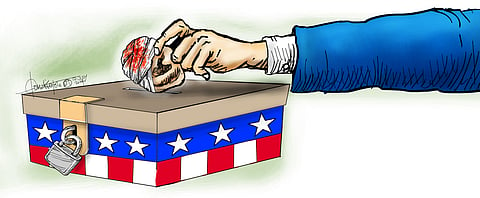
- NEWS
- the EDIT
- COMMENTARY
- BUSINESS
- LIFE
- SHOW
- ACTION
- GLOBAL GOALS
- SNAPS
- DYARYO TIRADA
- MORE

The assassination attempt on Republican presidential nominee Donald Trump — the 13th (former) US president or presidential candidate attacked and the eighth to survive an assassin’s bullet — was met with cries of concern for Trump from all ideological sides, including President Joe Biden who called up his rival shortly after the incident.
Twenty-year-old Thomas Matthew Crooks, a registered Republican but who, when he was 17, had donated $15 to ActBlue, a political action committee raising funds for Democratic politicians, was identified by the FBI as the failed assassin who was neutralized.
Authorities are still in the dark about Crooks’ motive for clambering up a roof in Butler, Pennsylvania to fire at Trump with a high-powered rifle. But what’s clear is this — the atmosphere in which he had acted is saturated with toxicity, one in which supporters of the rival candidates engage in an acrimonious rhetorical war in and out of social media.
“It’s a mood of intense foreboding,” observes New School historian Jeremy Varon, describing the assassination attempt as “eminently predictable; we are currently a polarized nation, and we are imploding.”
Experts, according to a report by Johns Hopkins University’s Agora Institute, believe political violence or the threat of it is harming American democracy, particularly the state of elections, and over half of them say elections have high potential for disruption.
For Republican pollster Frank Luntz, the US, as it is currently, “is an agitated country and worse is yet to come.” Luntz’s view is backed by a survey run by the Maris Institute for Public Opinion along with NPR/PBS NewsHour in April which found one in five Americans believing that, to put America back on track, violence is necessary to secure political objectives in 2024.
Roughly equivalent numbers of Democratic and non-aligned respondents said they saw violence as an option, with 28 percent of Republicans agreeing that violence may be a political strategy.
An even larger percentage of NPR/PBS NewsHour/Marist survey respondents preferred a leader who “breaks some of the rules to get the nation back on track,” with over 30 percent of Democrats concurring.
Meanwhile, Republicans, specifically supporters of Trump, have nil confidence in the fairness of American elections, with more than half in a USA TODAY/Suffolk University poll indicating early this year that they are skeptical about votes being counted accurately in the coming November presidential poll.
And there too are studies showing Americans increasingly becoming emotionally polarized, that is, “harboring strong dislike for members of the other party,” according to a study published in 2023 by Carnegie Endowment for International Peace senior fellow Rachel Kleinfeld.
A University of Chicago survey in June showed nearly seven percent of respondents believing that use of force is justified to restore Trump to the White House. Meanwhile, 10 percent said force would be justified to “prevent Trump from becoming President.”
Security analyst Colin P. Clarke, research director at security consulting firm Soufan Group, observed that the assassination attempt on Trump might be a moment that could unify Americans, but described the rest of the political season leading up to the elections as a “very dangerous time, indeed.”
With such a mood permeating politics in America less than four months before the elections, the attack on Trump may have shocked the US and the world but the incident wasn’t totally unpredictable.
World leaders, including President Ferdinand R. Marcos Jr., condemned the assassination attempt on Trump and made urgent appeals against political violence.
Trump himself initiated a shift from the usual acrid tone of his campaign to say that “it is more important than ever that we stand united.” But whether that statement was intended for the entire American body politic or meant only for his followers to close ranks even more tightly wasn’t certain.
But today, as he stands at the cusp of very likely becoming US president again, Donald Trump has a golden opportunity to show all and sundry that he can be an eminent statesman and be commander in chief, indeed, of a major superpower and the greatest democracy in the world.
No, he is not, as his supporters hailed him on social media, like Theodore Roosevelt who was shot by a former saloonkeeper (John Schrank) while delivering a speech as he campaigned for the presidency in Milwaukee, Wisconsin in October 1912.
“The comparison is not perfect,” pointed out Vox senior White House correspondent Andrew Prokop. “Theodore Roosevelt was shot during a campaign speech and he finished his speech, Trump did not finish his speech, and Roosevelt lost that election.”
That imperfect comparison with Roosevelt aside, Trump, on his own, could very well not only make America truly great again, but could actually be the eminent statesman that he is expected to be, if he could shush up the cantankerous Marjorie Taylor Greenes and other conspiracy theory-spouting fans and convert the extreme right and white supremacists in his camp into becoming authentic patriotic keepers of the rule of law, and go forth to raise the United States of America to lofty heights as the genuine leader of the Free World.
